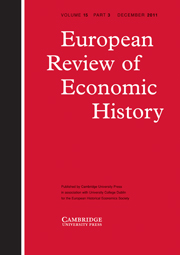Article contents
Democracy and business cycles: Evidence from portuguese economic history
Published online by Cambridge University Press: 07 September 2006
Abstract
The Portuguese Republic of 1910–1926 was characterised by extreme instability in the political and economic spheres. The authoritarian regime that succeeded the Republic claimed legitimacy asserting that democracy naturally implied fiscal and monetary instability. In this article we study the Republican period and the Monarchy that immediately preceded it, in order to test three hypotheses as to the roots of instability during the Republic: exceptionally high public expenditure made necessary by participation in World War I, the Fiscal Hypothesis; expansion of the money supply and increase in its variability, the Monetary Hypothesis; social and political unrest, facilitated by greater freedom in expressing grievances, the Democracy Hypothesis. Using standard econometric techniques we find strong evidence in favour of the Monetary and the Democracy Hypotheses but not in favour of the Fiscal Hypothesis. Moreover, our results support the view that political and monetary instability were mutually reinforcing phenomena. The examination of the two periods, Monarchy and Republic, reveals a strong positive association between political and economic cycles in the later, more democratic period.
- Type
- Articles
- Information
- Copyright
- Cambridge University Press 1999
- 4
- Cited by


